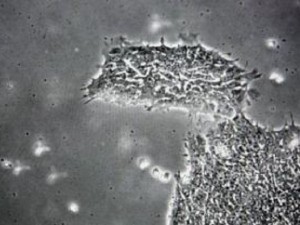Stem cells blamed for cancer re-growth
PARIS—Researchers presented evidence Wednesday for the existence of cancer stem cells, with three different studies seeking to end a decades-old scientific dispute about how tumors grow.
The discovery should lead to new drugs targeting stem cells that cause tumors to reappear after cancer therapy, the teams argued in three scientific papers published simultaneously in the journals Nature and Science.
“The hypothesis (that cancer stem cells exist) has been around now for some time. Hopefully these three papers now make an end to the discussion,” Dutch researcher Hugo Snippert told AFP.
All the studies were conducted on lab mice.
Some experts have maintained that tumors are comprised of masses of cancer cells that are all the same, and all dividing.
Article continues after this advertisementBut Snippert said the latest papers clearly show a hierarchy of cells in tumors, with different functions — including stem cells that act as cancer cell factories.
Article continues after this advertisementStem cells are infant cells that develop into specialised tissues of the body, touted by medicine as a future source from which to replenish damaged tissue.
In the case of intestinal cancer, a healthy stem cell mutates to create a “cell of origin” from which a tumor grows, said Snippert. The tumor contains stem cells which then create new cancer cells.
Cancer stem cells must now be targeted for drug research, argued Snippert, a member of the University Medical Center Utrecht research team which focused on intestinal cancer and published its findings in Science.
“Since the cancer stem cells are so similar to normal stem cells, most treatments also harm the normal stem cells,” he said.
“That is why it is important now to have a look at cancer stem cells, comparing them to normal stem cells to find the differences.”
Focusing on incurable brain tumors, a US-based research team said they had found a subset of cells that appear to be the source of new tumor growth after chemotherapy.
“This study serves as a proof of principle that in at least some solid tumors functional cancer stem cells exist,” researcher Luis Parada of the University of Texas Southwestern Medical Center told AFP.
Also writing in Nature, a separate team in Belgium and the UK found a sub-population of tumor cells with stem-like properties in skin cancer.
“Taken together these reports provide evidence that point towards the existence of cells that may represent cancer stem cells,” said a Nature press statement.
Snippert said the latest technology has allowed the scientists to examine tumor cancer growth in as natural a state as possible, unlike earlier studies that involved tumor transplants in lab mice.
The Dutch team was able to breed special mice in which different tumor cells displayed different colours which could then be studied under a microscope.
Say the tumor cells were red and the stem cell blue, the scientists could follow the stem cell’s progeny as they spread in the tumor.
“Because of the colours we could visualise everything within one and the same tumor in its original mouse at the original position where the tumor was formed,” Snippert said.
“It is more natural… as it would behave normally in patients.”
The three teams studied different organs using somewhat different techniques, but all with technology that allowed them to let the tumors grow undisturbed, said Snippert.
“Better understanding of the cancer stem cells will be critical for re-evaluation of existing therapies and development of new ones,” added Parada.
